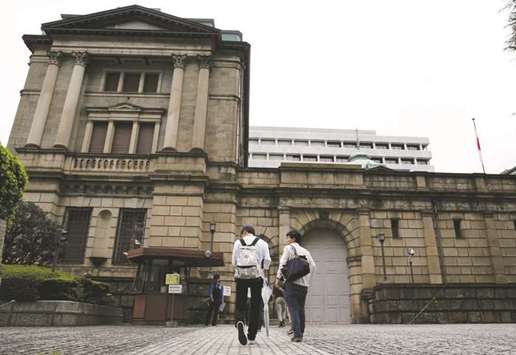As stocks surge and consumer prices inch higher, investors say it’s time for the Bank of Japan to reduce equity purchases that have been criticised for distorting the market.
Sometime next year, the BoJ will cut its annual buying target for domestic exchange-traded funds by as much as a third from the current ¥6tn ($53bn), says Toru Ibayashi, head of Japanese equities at UBS Wealth Management in Tokyo. Soichiro Monji of Daiwa SB Investments expects a similar reduction, but by the end of March.
“¥14tn,” UBS’s Ibayashi predicted. “And everybody will understand.”
Conditions have improved drastically since July last year, when the bank virtually doubled its ETF buying goal. Back then, investors were worried about another market downturn following Britain’s vote to leave the European Union. Now, they’re booking profits after Japanese stocks surged to their highest in 26 years, and watching as the economy marks almost a year of mild inflation. The Nikkei 225 Stock Average closed yesterday at its highest since 1992.
“Fear of deflation was behind the ¥6tn target,” Daiwa SB’s Monji said in an interview. “We’re no longer in that kind of environment. Risks are now skewed toward the upside, rather than the downside. It’s hard for the central bank to justify its buying spree.”
The BoJ started buying ETFs in 2010, with Governor Haruhiko Kuroda later accelerating purchases as part of an unprecedented stimulus package aimed at revitalising the economy.
The central bank had spent $150bn on Japanese ETFs as of December 8. It owned 74% of the market at the end of October, up from 65% a year earlier, according to Investment Trusts Association figures, BoJ disclosures and data compiled by Bloomberg.
Everyone from the head of the country’s stock exchange to the chairman of the Japanese Bankers Association has questioned the ETF programme’s size and whether it artificially depresses volatility. The central bank slowed purchases in October, when the Nikkei 225 rose for 16 straight days, its longest run on record.
The bank, which tends to buy on days stocks fall in the morning, purchased only ¥167bn of ETFs that month, well short of its monthly average of ¥505bn for the year until September.
Annual buying doesn’t necessarily need to be measured from January to December, BoJ governor Kuroda said in Nagoya last month, while stressing that the target was for “about” ¥6tn a year.
He sees no immediate need to adjust the pace of buying, he said.
The BoJ stepped up purchases in November after equities retreated, buying ¥598bn of ETFs. Ibayashi of UBS says the global economy has entered a positive cycle, allowing central banks around the globe to rein in massive easing programmes.
To him, the BoJ should be no exception, as companies are increasing capital spending, which he says will replace stimulus measures.
Federal Reserve policy makers are projected to raise the target range for their benchmark interest rate for a third time this year when they meet later this week. The European Central Bank decided in October to reduce monthly asset purchases by half starting in January.
“Given the circumstances at this point in time, it is difficult for the BoJ to keep buying ETFs at ¥6tn per year,” Ibayashi said.
Jonathan Garner, chief Asia and emerging markets equity strategist at Morgan Stanley in Hong Kong, says the ETF purchases have become “perhaps the most controversial part” of the bank’s stimulus programme. The BoJ’s measures include everything from negative interest rates and yield-curve control to buying tens of trillions of yen of bonds each year, on top of its stock purchases.
“The current easing programme is a bit too much,” said Kazuyuki Terao, chief investment officer at Allianz Global Investors Japan Co. “A bullish market presents a window for the BoJ to decrease its purchases.”
Naoki Kamiyama, chief strategist for Nikko Asset Management Co in Tokyo, and Hisao Matsuura, a strategist at Nomura Holdings, say the BoJ won’t cut its ETF target anytime soon. For them, the bank is still far from its 2% inflation goal, and market distortion is less of a concern.
While the BoJ owns about three-quarters of Japanese ETFs, that’s less than 4% of the stock market.
“Why would the BoJ change?” Kamiyama said. “It would hurt investor confidence and make a pickup in inflation much less likely.”
Core consumer prices, which exclude fresh food, rose 0.8% in October from a year earlier, still less than half Kuroda’s goal, despite the tightest labour market in decades and an economy that’s chalked up seven straight quarters of growth.
But Ibayashi and Monji say any cutback in ETF buying wouldn’t hurt the economy or prices. Spending 4tn yen a year is plenty, according to Ibayashi, who expects the bank to promise to step in again when needed if it does lower the target.

Men walk towards the Bank of Japan building in Tokyo. As stocks surge and consumer prices inch higher, investors say it’s time for the BoJ to reduce equity purchases that have been criticised for distorting the market.
